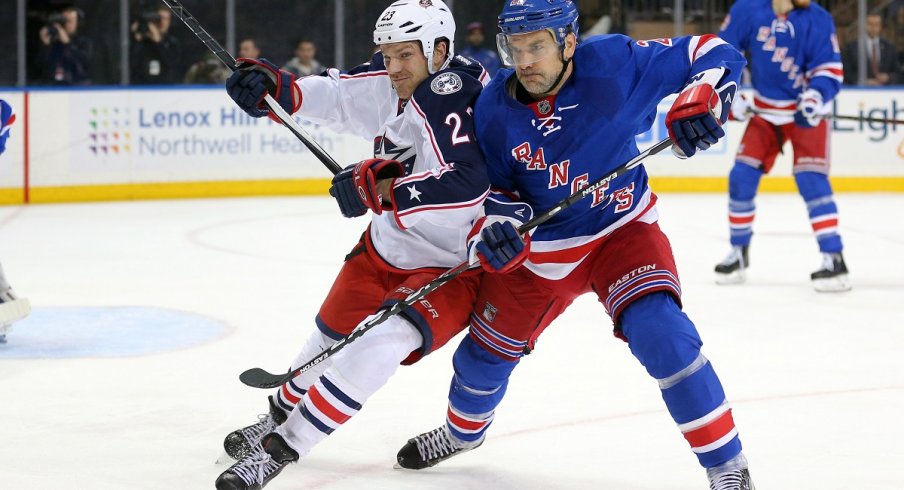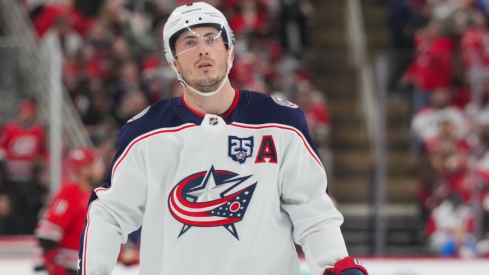As long as humans serve as GMs and run hockey teams, bad contracts will be offered and subsequently signed.
And as long as the NHL is in a salary cap format, bad contracts will be traded – alongside appealing, legitimate assets – as a mea culpa, of sorts. In the summer of 2017, the Chicago Blackhawks were trying to stay on top of the hockey world, having won the Stanley Cup three times since 2009. In what had become an off-season season tradition, the Blackhawks knew they would have to trade away assets - some on good contracts, some on bad ones - in order to stay competitive.
Let me tell you a quick story about two former Blackhawks, Teuvo Teravainen and Bryan Bickell. Bickell, 30, was a bottom-six forward who had a good playoff that one time in 2013. The Blackhawks responded in kind by giving him a four-year, $16M contract (with a modified trade clause, no less!). Teravainen was a 21-year-old who showed promise, still on his entry-level contract. Chicago, with no cap space, needed to move on from Bickell.
They found a trading partner in the cap-floor-dwelling Carolina Hurricanes, who were bribed to take on the Bickell contract by also adding Teravainen, who, at 24, just capped off a 76-point season. The Hurricanes sent back a 2nd and a 3rd round pick in the borderline-heist.
It's a cautionary tale, yes, but it's also one of opportunity. The Hurricanes didn't draft Teravainen. They didn't have scouts that knew something about Teravainen that the Blackhawks didn't know. They weren't even lucky, because that would apply chance. They were opportunistic, happy to pounce on another team's poor cap management.
Three years later, not much has changed.
Bad contracts are still being sent around the league in the name of adding cap space. And teams with cap space are (and should be!) happy to oblige. David Clarkson, the former Blue Jacket currently on long-term injury reserve (LTIR), just got traded back from the Vegas Golden Knights to the Toronto Maple Leafs in their attempt to aid their salary cap situation.
A quick scan of the trades this summer evidence a number of trades that are largely salary cap dumps. P.K. Subban, Patrick Marleau, Justin Braun, Erik Haula, Colin Miller, Ryan Callahan, Nikita Zaitsev, Carl Soderberg, Calvin De Haan, Nikita Gusev, and J.T. Miller are all players that were moved – at least in some part – due to their former team's difficult salary cap situation.
The Blue Jackets, you may have noticed, were not involved in any of the above trades. And before you mention that Zach Werenski still needs to be signed (which is true), the club will still have $9M, even being conservative, with no other players left to be signed. Another argument I would anticipate are the big tickets going down the pike for Pierre-Luc Dubois, Josh Anderson, etc. It's a fair point in a vacuum, but there were plenty of players on the above list (Clarkson, Marleau, Callahan, to name a few) who are on the final year of their contract, making future contracts a moot point.
That the Blue Jackets have a great deal of cap space, one of the weaker prospect pools in the NHL (partly due to graduations, partly due to a lack of draft picks), and a need for additional talent infusion into the organization should have incentivized them to add a bad contract with one-year of a term attached with a player, prospect, or draft pick(s) for one of their log-jammed wingers (come on down, Sonny Milano).
The Blue Jackets have cap space. Teams covet the ability to have cap space. Cap space is a weapon, an asset, but that's only true when it's properly utilized. Saving money in 2019 does nothing for them in 2020 and beyond. As Steve Carell may point out, if you don't use cap space, you lose it.
Jarmo Kekalainen knows this, and perhaps there simply haven't been many opportunities that have come across his desk. But as teams around the NHL, especially in the Metropolitan Division, have improved dramatically this summer while the Blue Jackets hold onto their cards, it's hard not to wonder if they are losing it by not using it.

